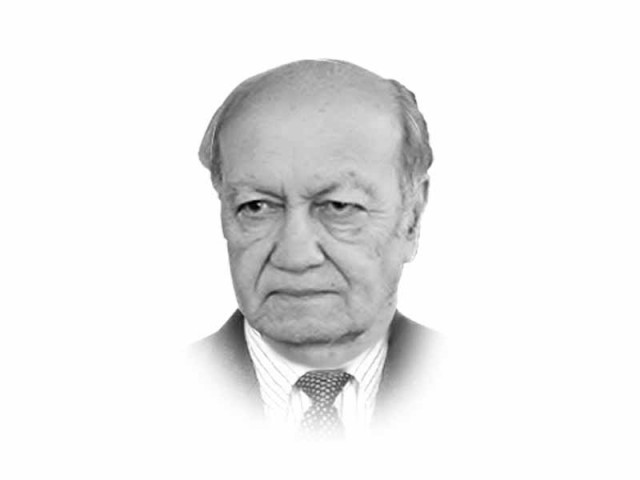Are multiple policy reversals good governance?
As the object is to seek clarity and not personalise the discussion one would refrain from naming individuals

The writer is a retired lieutenant general of the Pakistan Army and a former federal secretary. He has also served as chairman of the Pakistan Ordnance Factories Board
He also maintains that a great leader is one who frequently resorts to U turns. The more intriguing statement was PM’s analogy that “Hitler and Napoleon would not have suffered losses had they taken U-turns.” Firstly, there is no relevance between these military expeditions and his political U-turns. Hitler’s ideological programme was to dominate Europe. He considered German’s Aryan ancestry superior to any other races and Jews and Bolsheviks as racially and ideologically inferior and intimidating. He was a ruthless and paranoid dictator in the guise of a democrat that brought untold misery to his own people and to Europe by waging a brutal war spanning five years.
Napoleon’s launch of massive invasion of Russia in 1812 in retaliation for its restrictive trade policies ended up in the withdrawal and defeat of French Grande Armee. This was followed by the decisive defeat of Napoleon at Leipzig in October 1813 and the capture of France in March 1814, forcing Napoleon to abdicate in April.
No reasonable person would disagree with the PM that policies have to be modified in the light of changing circumstances. The matter, however, is different from the point that he is raising.
As the object is to seek clarity and not personalise the discussion one would refrain from naming individuals because the focus should remain on the substance of the argument.
Imran Khan’s point that a leader who does not take U-turns according to the requirements of the situation is not a real leader is understandable if circumstances justify it. But this analogy bears no relevance in the current context and is flawed.
The PM had condemned and made derogatory remarks about several politicians in the past on the basis of their presumed character failings or poor performance or a combination of both. Does he now feel his initial judgment was based on lack of understanding or since then there is a discernable improvement in the character traits of these persons? And this justifies appointing them as members of the cabinet or giving them important positions in provincial and federal governments. However categorising such decisions as an act of strong and able leadership is rather farfetched.
It is a different matter that many of PTI’s politicians like in other parties who have worked hard during elections to attract the votes of the people are not necessarily great believers in democracy.
Similarly, on another important national issue Imran Khan took definitive and categorical positions that he would never seek financial assistance from the IMF. One can overlook his backtracking that he was not well-versed about economic issues and these statements were more a part of his idealistic passion for seeing Pakistan economically autonomous.
Imran Khan had built the entire edifice of the PTI on the premise of creating a new framework of morality and ethical values supposedly without compromising on basic human and religious values. The people do not expect that he or his team members would make compromises and U-turns. However, this does not prevent him and his cabinet members from exercising considerable flexibility in political and economic decision-making. The only proviso being that these decisions or undertakings should not undermine fundamental value system.
Media and the broad masses would be justified in asking that if certain politicians were rightly unacceptable to him due to their past record that smacked of personal and professional failings what has transformed or transpired that they are acceptable now, especially in the context of Naya Pakistan. Has there been any reformation of these individuals that has taken place that has sanctified their acceptance or is it sheer expediency. For it is expected that opinion of national leaders do not change with kaleidoscopic effect unless there is a distinct fundamental reason to justify it.
Importance of adhering to an ethical and legal value system is necessary for running the affairs of the state. Navigating in rough political environment without a compass could land the country in serious trouble.
If we take a bird’s-eye view of the world we find only those countries are prosperous and peaceful where the leaders and institutions adhere to a civilised code of conduct and conform to a supportive constitutional and legal framework. Of course countries like ours that are driven by ethnic, tribal and communal divisions and have emerged from the tutelage of prolonged colonial rule it is not easy to enforce these values. Yet if we have to change leaders should conform to a value system.
For Imran Khan the greatest challenge is to balance his priorities. Does he aim at politically burying his opponents with the support of the establishment? Is he aiming at steering through the economic quagmire that is compounded by structural problems, bleeding enterprises, inefficient governance and fiscal and monetary challenges? Does he hope to bring peace and tranquillity on the borders by engaging cooperatively with hostile and estranged neighbours — Afghanistan, India and the US? Keeping in mind that the threat of terrorism is still not completely over. And yet aiming at fulfilling the jewel of his national agenda of providing a million houses for the poor.
Is it feasible with the current resource base to show concrete results in these multiple directions simultaneously or major readjustments and calibration would be necessary. Success, part success, or failure would much depend on how the PM and party tackle these challenges.
Published in The Express Tribune, November 21st, 2018.
Like Opinion & Editorial on Facebook, follow @ETOpEd on Twitter to receive all updates on all our daily pieces.















COMMENTS
Comments are moderated and generally will be posted if they are on-topic and not abusive.
For more information, please see our Comments FAQ